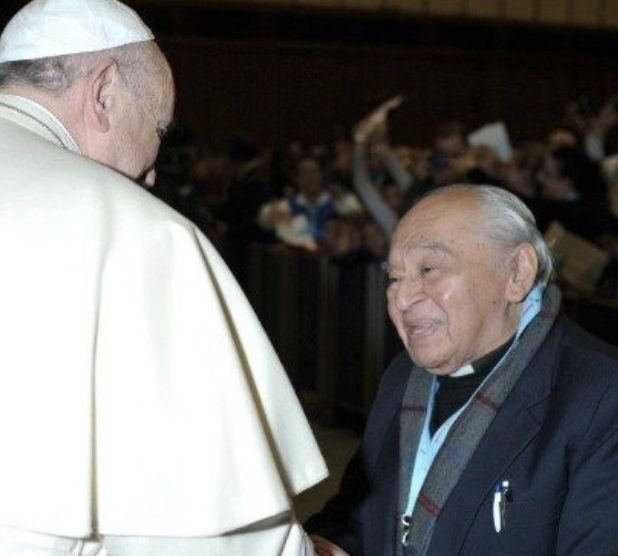News
Gustavo Gutiérrez, Protagonist of Liberation Theology

2 november 2024
📍 Dr. María José Caram teaches theology in spanish, at Domuni Universitas, as well as at the Catholic University of Córdoba – Argentina. She pays tribute to Gustavo Gutiérrez, OP, recently deceased, who was her friend and mentor.
"Without him, would there be Francis?"
It is not easy to recall the friend and teacher that Gustavo Gutiérrez was. Especially when the memories come with intensity, overwhelming us with how his testimony and teachings have marked our lives and theological work.
Friend and Teacher
I met Gustavo in 1992, when I had just arrived in Lima, at a theology course organized by the Pontifical Catholic University of Peru.
These were difficult times. The country was suffering from a terrible internal war initiated by the Communist Party-SL, which, days before, had shot and blown up the body of the social leader María Elena Moyano. Even today, Peru continues to suffer greatly, like so many other Latin American countries ravaged by extreme poverty, murderous violence, and corruption.
That year, and in those circumstances, I met Gustavo, the friend and teacher of so many people and communities. From then on, I had the opportunity to interact with him during national meetings of pastoral agents, regularly organized at the Bartolomé de las Casas Institute, or during my visits to Cusco.
While preparing for my doctorate in theology, we had many conversations about the texts I sent him, which he read and commented on in detail. I learned from his erudition, but also from his warm, simple, and inspiring way of speaking about God and the poor. He spoke with affection, wisdom, and insight, never losing his sense of humor.
Gustavo used to say that theology is done in two acts: the first consists of living in silence before God, welcoming His will, and committing to our brothers and sisters. The second, theology, comes afterward. This was precisely his way of acting, and it was evident. He was truly a friend of the “Friend of life” (Wisdom 11:26), without duplicity. That is why he was a teacher, because his life was a testimony of the love of Truth that makes us free.
He once described his book A Theology of Liberation: History, Politics, and Salvation as a “love letter to God, the Church, and the people...” and said that “the love remains alive, but it deepens and the way of expressing it changes.” Regarding this love, a mutual friend recently reminded us, in these days of mourning, that Gustavo wanted a phrase by George Bernanos inscribed on his tombstone: “When I die, tell the sweet kingdom of the earth that I loved it much more than I ever dared to confess.”
Protagonist of Liberation Theology
It is fitting to call Gustavo Gutiérrez the “protagonist of Liberation Theology.” Many recognize him as the “father of this theology.” However, even though his book gave the name to this theological current born in Latin America, Gustavo’s work is best understood when placed in the broader context of a new way of speaking about God on this continent, marked by “oppression and dispossession” and the shared experience of fighting against injustice to build a more free and humane society.
His reflection draws from the sources of Christianity to give an account of hope, while also embracing the intuitions of thinkers such as José María Arguedas, with whom he shared a brief but profound friendship. Gustavo considered Arguedas a “forerunner of liberation theology” and included a passage from his novel All the Bloods as the opening epigraph of his work, depicting a God who reveals Himself from the reverse side of history.
Gustavo’s work is a significant contribution, shaped by the efforts to receive Vatican II in Latin America, through conferences of the Episcopate, ecclesial assemblies, and dialogues with other theologians. He was a man of the Church, living in the context of the martyrial witness of many Christians, theologians, and pastors, such as Archbishop Oscar Romero and Enrique Angelelli.
A Courageous Commitment
Though Gustavo was not called to give his life in a bloody way, he offered it drop by drop, through the misunderstandings and persecutions he endured. He always responded with honesty, knowing that the unity of the Church is an ongoing process that must be achieved with courage and freedom of spirit, sometimes at the cost of painful sacrifices.
The Legacy and the Question of Francis
The organizers ask whether Francis would exist without Gustavo Gutiérrez. While we cannot establish a direct causal link, we can say that the current Pope embraces the main principles of liberation theology, rooted in the aspirations of the people, John XXIII, and Vatican II.
Both Gustavo and Francis, as Latin Americans, shared the challenges of receiving the Council, each in his way, one as a theologian and the other as a pastor. The Spirit, who guides the Church, has been revealed through these two great men.
I would like to end this tribute to Gustavo Gutiérrez with the words of theologian María Clara Lucchetti Bingemer: “The theologian is a public witness to the revelation of God and the faith of His people... a ‘concrete exegesis’ of faith.”
María José Caram
October 30, 2024

